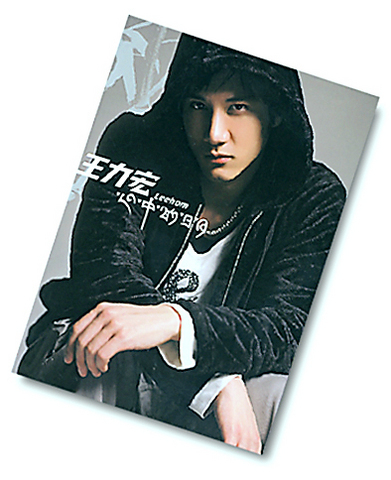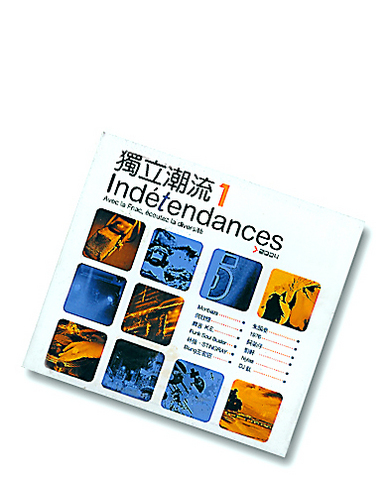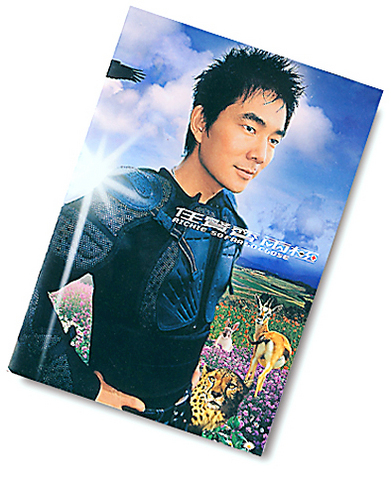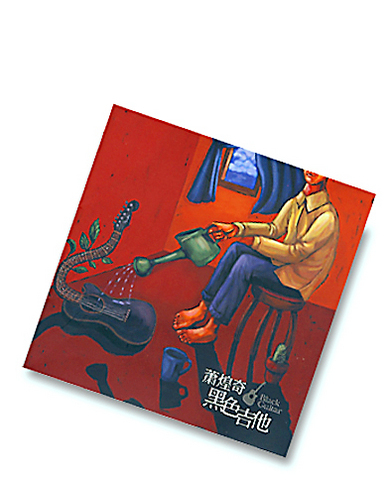The Heart of the Sun and the Moon
Wang Lee-hom

Sony

According to the liner notes on Wang Lee-hom's (
Wang may well have set out to, as he puts it, "create a new vibe the whole world can identify with as being Chinese," but the result is far from pleasing. The Heart of the Sun and the Moon is instead a rather odd and at times perplexing album on which Wang mixes up Mando pop standards and mild R&B / hip-hop with the odd sprinkling of traditional Chinese music.

The album gets off to an orthodox start with the pop / funk tune Open Your Heart" (放開你的心), which, apart from the odd strains of a traditional Chinese orchestra, certainly doesn't break any new musical boundaries. The album's title track follows in much the same vain as the opener and listeners could be forgiven for asking just what Wang's "chinked-out" is all about.

The closest any of the album's tunes come to answering this question is on Deep Bamboo Forest (
The bottom line is that fans of Wang may well find the manner in which he blends the odd sample into tunes enchanting and different, but those with a more open mind will simply be left "Wanged-out."
Indetendances
Various
FNAC
As a result of the popularity of FNAC's 2002 Indetendency series, which featured tunes by an eclectic collection of indie musicians and bands from Europe, the French-owned department store recently released the first in a series of CDs featuring some of Taiwan's leading indie acts.
Predominantly electonica-based with a sprinkling of standard alt rock / pop thrown in for good measure from more conventional acts like 1976 and Joy Topper (
While fans of many of the acts will have heard all the tunes before, those with a whim for discovering just what makes the local underground electronic music scene click should enjoy the feast of largely downbeat and ambient-inspired numbers.
Ambling in with Monbaza and a raw and -- it should be said -- rather annoying version of its jerky industrial-noise-based One Love (
Thankfully, Ciacia (何欣穗) and her laid-back bouncy pop anthem Make Each Other Happy (讓彼此快樂) follows the morbid opener and from this point on the compilation does its best to please.
Highlights of the 12-track CD include Funk soul Buster's interestingly ambient Sea Wave, Lim Giong (
So Far so Close
Richie Ren
Magic Stone
If it's pure and pompless Mando pop that your after, then you can't really go wrong with Richie Ren (任賢齊). For over a decade, Ren has been at the forefront of the music scene throughout greater China and it doesn't look like he's any hurry to pull the rip cord just yet.
He might look like an idiot decked out in a motor-cross safety vest on the gaudy cover art, which is certainly the worst album cover design this reviewer has seen in a very long time, but then who cares? This is, after all, Richie Ren and you always know where you stand when it comes to the Mando pop idol.
To his credit he's never bothered to dabble long with rap and has shunned the hip-hop fad that has swept through the Mando music scene. Instead, Ren has simply continued to do what he's unquestionably best at: producing and performing quality Mando pop standards.
The material on Ren's latest album will not surprise and will not shock. Tunes like the rock guitar-driven sing-a-long anthem Will Never Retreat (永不 退縮), the slow blues-influenced ballad Poles Apart (兩極), and the moody After Tomorrow (明天過後) will please Ren fans.
The album's highlight, however, is the unhurried pop/blues number Tears are Use (眼淚沒有用), which, while far from ground-breaking, is a classic Ren at his conventional best.
Black Guitar (黑色吉他)
Xiao Huang-chi (蕭煌奇)
Axis
Blind singer/songwriter Xiao Huang-chi (蕭煌奇) first hit the scene two years after the release of his debut You Are My Eyes (你是我的眼), on which he was joined by Taiwan's leading blind act and The Touch Band (全方位樂團).
The album may not have enjoyed huge chart success, but music industry insiders thought highly enough of it to nominate Xiao for Best Performance by a Male Musician and Best Songwriter at last years Golden Melody Awards.
Xiao didn't leave the award ceremony with a gaudy piece of gold to put on his mantelpiece, which is hardly surprising when you consider his major label opposition, but he certainly made his mark.
Xiao released his second longplayer on Christmas Day and from start to finish it is a great piece of work. Part folk, part eclectic collection of musical genres, Black Guitar is one of those rare albums that has something for everyone.
Don't be put off by the initial natty 1980s-style synthesized 12 seconds, as As Bright as Heaven (天若光) transforms itself into slow, winding, soulful Taiwanese ballad with a pleasing and memorable beat.
There's not a dud on the whole album, but some of the more interesting moments include the Latino-vide fueled and lounge-like Disorderly Dance (情亂舞) and the comedic and playful The Kid from the Yuan Family (阮家那兩個囝仔), a tune that sees Xiao toying masterfully with an off-center country western beat.
Need to succeed (一定要成功) is the highlight, however, with its spaghetti western-like barrage of brass, Ricky Martin-like Latino pulse and kick-ass surf-folk chorus.

US President Donald Trump may have hoped for an impromptu talk with his old friend Kim Jong-un during a recent trip to Asia, but analysts say the increasingly emboldened North Korean despot had few good reasons to join the photo-op. Trump sent repeated overtures to Kim during his barnstorming tour of Asia, saying he was “100 percent” open to a meeting and even bucking decades of US policy by conceding that North Korea was “sort of a nuclear power.” But Pyongyang kept mum on the invitation, instead firing off missiles and sending its foreign minister to Russia and Belarus, with whom it

When Taiwan was battered by storms this summer, the only crumb of comfort I could take was knowing that some advice I’d drafted several weeks earlier had been correct. Regarding the Southern Cross-Island Highway (南橫公路), a spectacular high-elevation route connecting Taiwan’s southwest with the country’s southeast, I’d written: “The precarious existence of this road cannot be overstated; those hoping to drive or ride all the way across should have a backup plan.” As this article was going to press, the middle section of the highway, between Meishankou (梅山口) in Kaohsiung and Siangyang (向陽) in Taitung County, was still closed to outsiders

Many people noticed the flood of pro-China propaganda across a number of venues in recent weeks that looks like a coordinated assault on US Taiwan policy. It does look like an effort intended to influence the US before the meeting between US President Donald Trump and Chinese dictator Xi Jinping (習近平) over the weekend. Jennifer Kavanagh’s piece in the New York Times in September appears to be the opening strike of the current campaign. She followed up last week in the Lowy Interpreter, blaming the US for causing the PRC to escalate in the Philippines and Taiwan, saying that as

The Chinese Communist Party (CCP) has a dystopian, radical and dangerous conception of itself. Few are aware of this very fundamental difference between how they view power and how the rest of the world does. Even those of us who have lived in China sometimes fall back into the trap of viewing it through the lens of the power relationships common throughout the rest of the world, instead of understanding the CCP as it conceives of itself. Broadly speaking, the concepts of the people, race, culture, civilization, nation, government and religion are separate, though often overlapping and intertwined. A government